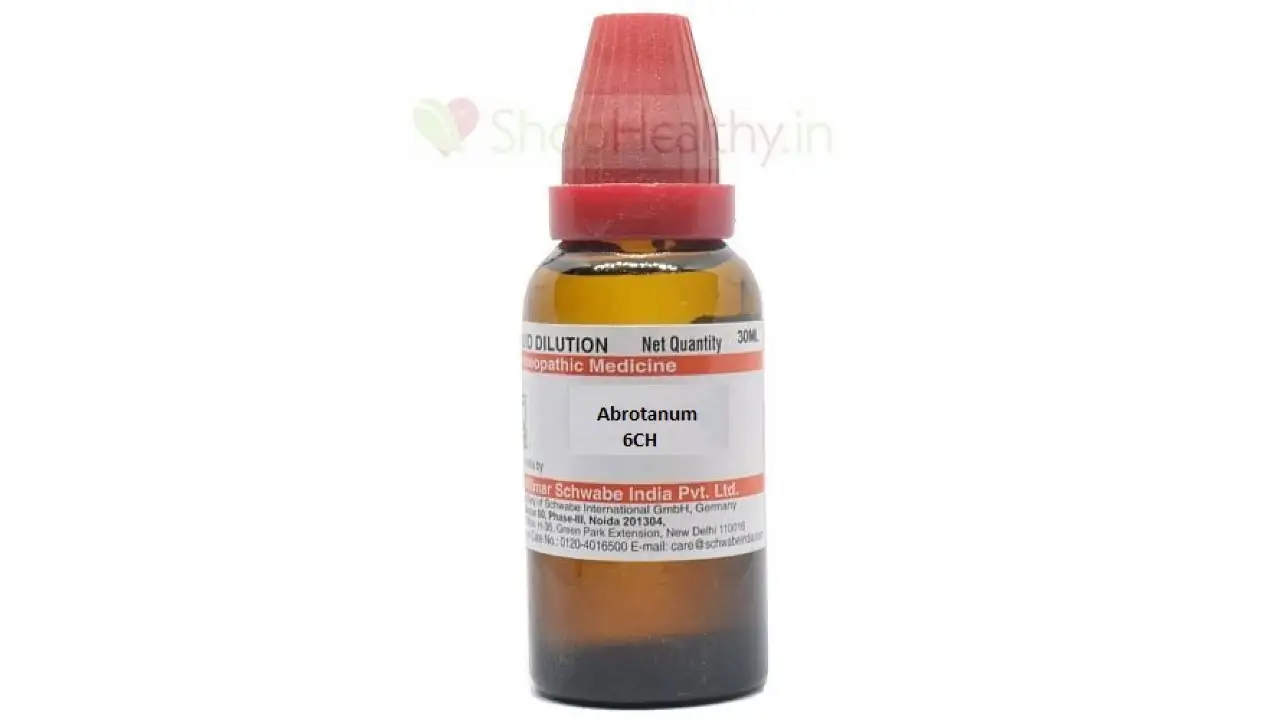Willmar Schwabe India Abrotanum 6CH 10ml
It is a plant that is native to Eurasia and Africa and is a member of the Compositae family. Abrotanum is also known as southernwood, lady’s love, or Artemisia abrotanum. It is a shrub with grey-green, small, thin, and feathery leaves, and its small, yellow flowers. It is easily propagated by the division of roots or cuttings.
In the past, Abrotanum has been used as an air freshener and an insect repellent due to its potent camphor-like scent. It is also used as a cooking herb in Italy and in traditional medicine for the treatment of jaundice in east and north Bosnia and Herzegovina.
1. What are some of the different ways that homeopathy uses abratanum?
Abrotanum 30 uses include treating conditions such as boils, chilblains, epilepsy, hemorrhoids, hectic fever, hydrocele, paralysis, myelitis, indigestion, marasmus, oozing from umbilicus, gout, and rheumatism. Some notable Abrotanum 30 benefits in homeopathy include:
When a pressing sensation persists in the affected area and prevents the patient from breathing freely, it is particularly indicated for the treatment of pleurisy. The patient may then complain that the cold air hurts their respiratory tract.
After influenza, it treats the lingering weakness and prostration.
In particular, if skin turns purplish after eruptions are suppressed, it aids in the treatment of boils.
Hard growths in various abdominal regions are removed by it.
Large amounts of very offensive fluid that are frequently accompanied by abdominal cramping, burning, and gnawing pain are controlled through the use of this medication.
After a bout of colic, it aids in easing limb contractions.
2. What are the typical conditions that Abrotanum is prescribed for in homeopathy?
There are specific defining indications for the prescription of Abrotanum homeopathic medicine.
The most prominent sign of Abrotanum 30 is wasting, especially of the lower extremities. This is more frequently observed in children with marasmus. In addition, it has been observed that these children have ravenous hunger despite eating well and have loose flesh.
A common complaint among patients seeking abrotanum is that they experience an odd sensation in their stomachs, as if it were hanging or floating in water.
The occurrence of metastasis is another distinctive sign of abrotanum.
Rheumatoid arthritis that has spread from joints to the spine or the heart.
Other complaints started after the gout started to subside.
Checked diarrhea was followed by rheumatism.
following rheumatic complaints, the development of piles.
Additionally, because abrotanum has an exudative tendency, it aids in treating exudations into joints, the pleura of the lungs, etc. that could be caused by a metastatic process or otherwise.
Additionally, it results in conditions that alternate between one disease symptom disappearing and another one emerging.
3. What causes an Abrotanum patient’s suffering to worsen or improve?
It has been observed that the symptoms for which Abrotanum is prescribed tend to worsen at night and after exposure to cold air, and that sudden backaches in Abrotanum patients improve with activity.
4. Which patients react to Abrotanum’s effects the best?
It is most effective for the following newborn complaints, especially in boys:-
Hydrocele
Dry nose coupled with epistaxis
newborn’s navel is dripping with blood or moisture.
Ascarides in particular, worms
Despite having a healthy appetite, marasmus and emaciation, particularly in the lower extremities.
In a patient who responds well to abrotanum, the following other generalities are frequently observed:
Very angry, irate, mentally depressed, without any compassion, and enjoys being cruel.
The child has trouble thinking and comprehending, is unable to hold his head up, and becomes fatigued by even the smallest mental effort, such as having a conversation.
The patient is immobile and experiences generalized weakness and soreness.
The patient has a strong desire for milk-boiling bread in particular and has a good appetite.
Blue rings are visible around the eyes, and the face is aged, pale, and wrinkled.
Skin is loose-looking and flabby.
Emaciated comedones are present.
forehead veins that are enlarged
Conclusion
Emaciation, especially of the lower extremities, is a characteristic feature that prompts the prescription of Abrotanum in the majority of cases. This emaciation occurs due to a variety of conditions, especially those involving metastasis or alternating conditions, and is found to be helpful in a variety of complaints affecting newborns and children, such as epistaxis and hydrocele oozing from the navel.
Produced in India by Dr. Willmar Schwabe India Pvt. Ltd., Sector-60, A-36, Noida, Uttar Pradesh, 201304.
India is the source nation.
Dr. Willmar Schwabe India Pvt. Ltd.’s registered office is located at H-36, Green Park Extension, New Delhi, India, 110016.
Important Information: Under the direction of a homeopathic physician.
| Attributes | |
|---|---|
| Brand | Dr. Willmar Schwabe India |
| Container Type | Glass Bottle |
| Shelf Life | 5 Years From Date Of Manufacturing |
| Remedy Type | Homeopathic |
| Country of Origin | India |
| Homeo Forms | Dilution |
| Potency | 6 CH / 6CH |
| Price | ₹ 70 |

Comments are closed.